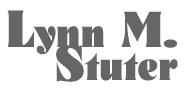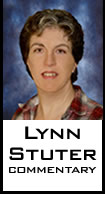

OUR DEMOCRACY?
Lynn M. Stuter
February 9, 2003
NewsWithViews.comNot long ago, a local television station aired a piece featuring U. S. Representative George Nethercutt, 5th District, Washington State. Representative Nethercutt holds the distinction of having unseated a sitting Speaker of the House--Tom Foley. In the piece, Representative Nethercutt spoke of "our democracy."
Our democracy? When did our nation become a democracy? Did we citizens have a Rip Van Winkle moment? So, what's the fuss all about, anyway?
Remember the Pledge of Allegiance:
"I pledge allegiance to the flag of the United States of America, and to the REPUBLIC for which it stands, one nation, under God, indivisible, with freedom and justice for all."
We are a republic. My goodness, what a news flash! So what is the difference between a republic and a democracy?
A democracy is a form of government in which the citizens exercise direct government, one person one vote, with majority rule. James Madison, in Federalist #10, spoke for the Founding Fathers when he wrote:
"From this view of the subject, it may be concluded, that a pure Democracy, by which I mean a Society consisting of a small number of citizens, who assemble and administer the Government in person, can admit of no cure for the mischiefs of faction. A common passion or interest will, in almost every case, be felt by a majority of the whole; a communication and concert results from the form of Government itself; and there is nothing to check the inducements to sacrifice the weaker party, or an obnoxious individual. Hence it is, that such Democracies have ever been spectacles of turbulence and contention; have ever been found incompatible with personal security, or the rights of property; and have in general been as short in their lives, as they have been violent in their deaths."
In this one short, concise paragraph, James Madison laid out the problems inherent to a democracy: rule by man with the rights of the minority at the whim of the passions and opinions of the majority; in a short time, resulting in civil unrest and chaos, leading to bloodshed and violence as people rebel against the tyranny and oppression of arbitrary and capricious rule. Democracy is often referred to as "mobocracy."
Our Founding Fathers, obviously wishing to avoid the problems inherent to a democracy, established our nation as a Constitutional Republic, in which rule is by law, not by man in accordance with his own passions and opinions; and establishing the first ten amendments to the Constitution--the Bill of Rights--to protect the minority, the dissenter, from the whims of the majority; to establish equal protection under the law for all.
Our Founding Fathers also established representative governance in which the people elected, by secret ballot, those who would represent them in assembly to make laws. These representatives would be bound to uphold the constitution of their state and the United States by Oath of Affirmation, commonly referred to as the "oath of office." Article VI, Section 3, United States Constitution:
"The Senators and Representatives before mentioned, and the Members of the several State Legislatures, and all executive and judicial Officers, both of the United States and of the several States, shall be bound by Oath of Affirmation, to support this Constitution ...."
So, if our nation is a Constitutional Republic, why do government documents, briefs, reports, and our elected representatives continually refer to it as a "democracy?" Is this just a slip of the lip, or what?
Concerned citizens have documented, with ever-increasing frequency in the past ten years with the "transformation" of our nation, a move away from representative governance to governance by appointed councils, committees, and task forces. In the words of James Madison, "...a small number of citizens, who assemble and administer the Government in person ..." Rule by man according to his own passions and opinions rather than rule by law as laid down by constitutions of the several states and the United States.
People are watching their rights trampled on, ignored and steam rolled by groups and government bodies whose focus may be politically correct, but is certainly not constitutionally correct.
The chasm is becoming ever wider between those who are doing the trampling and those being trampled on. As that chasm grows, chaos and civil unrest will ensue. America is headed down the path of violence that James Madison warned against.
Every elected official--every legislator, governor, president, judge, sheriff, county official, city official--who has embraced the tenets of democracy do so in violation of their Oath of Affirmation to uphold the constitution of their state as well as that of the United States.
What is the remedy? Thomas Jefferson, 1779:
"The most effectual means of preventing the perversion of power into tyranny are to illuminate...the minds of the people at large, and more especially to give them knowledge of those facts which history exhibits, that they may...know ambition under all its shapes, and... exert their natural powers to defeat its purposes."
James Madison:
"...the people ought to be enlightened, to be awakened, to be united, that after establishing a government, they should watch over it ... It is universally admitted that a well-instructed people alone can be permanently free."
The answer is not more laws, the answer is to educate, that every citizen, every voter, every teacher, every elected official should have a thorough understanding of representative governance, of the constitution of the several states and the United States.
We are not a democracy; we are a Constitutional Republic in which every man, woman and child has a responsibility, a duty, to understand and practice the concepts of self-governance.
© 2003 Lynn M. Stuter - All Rights Reserved
Mother and wife, Stuter has spent the past ten years researching systems theory with a particular emphasis on education. She home schooled two daughters, now grown and on their own. She has worked with legislators, both state and federal, on issues pertaining to systems governance and education reform. She networks nation-wide with other researchers and citizens concerned with the transformation of our nation. She has traveled the United States and lived overseas. Web site: http://www.icehouse.net/lmstuter E-Mail: lmstuter@mail.icehouse.net